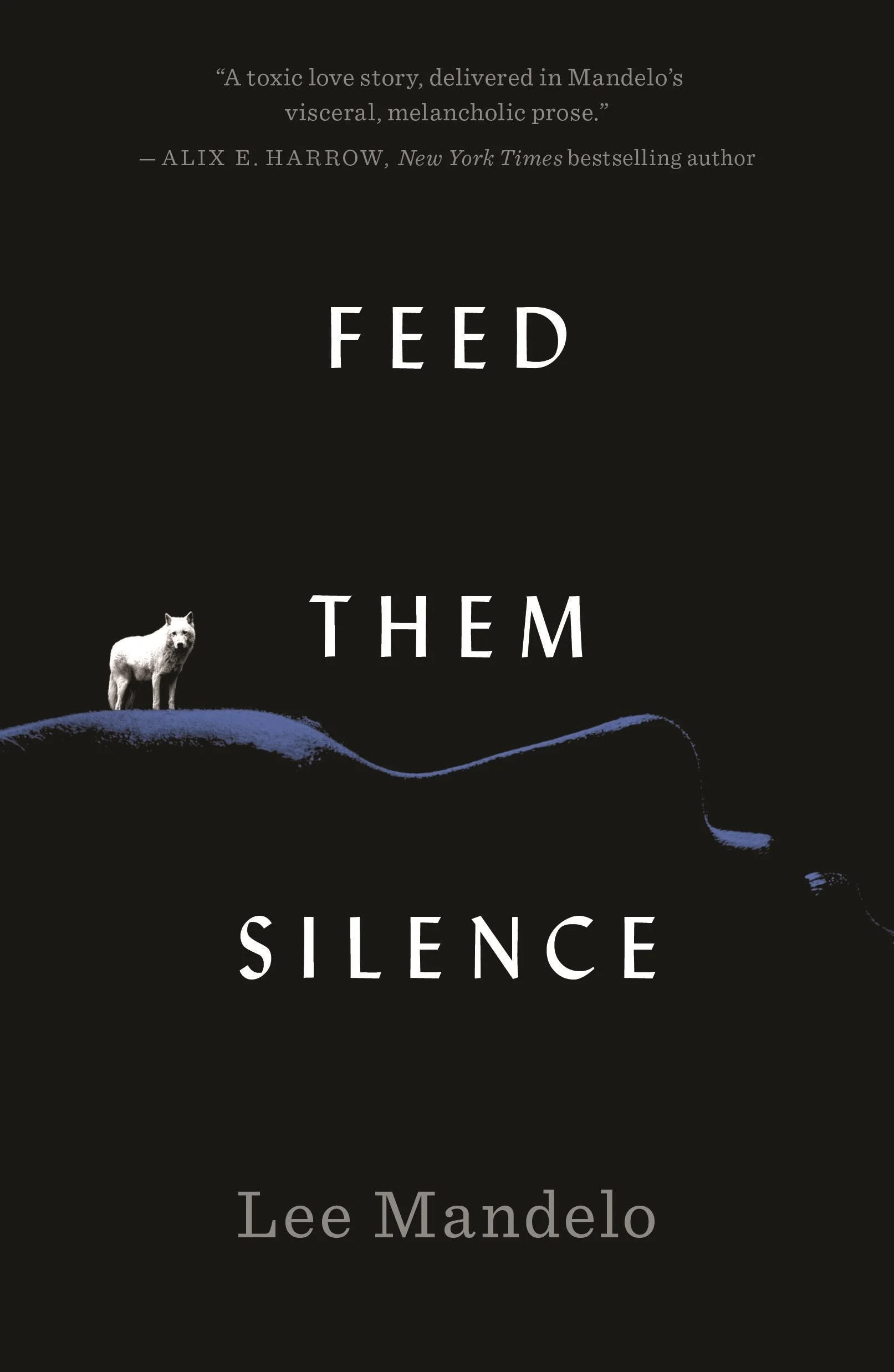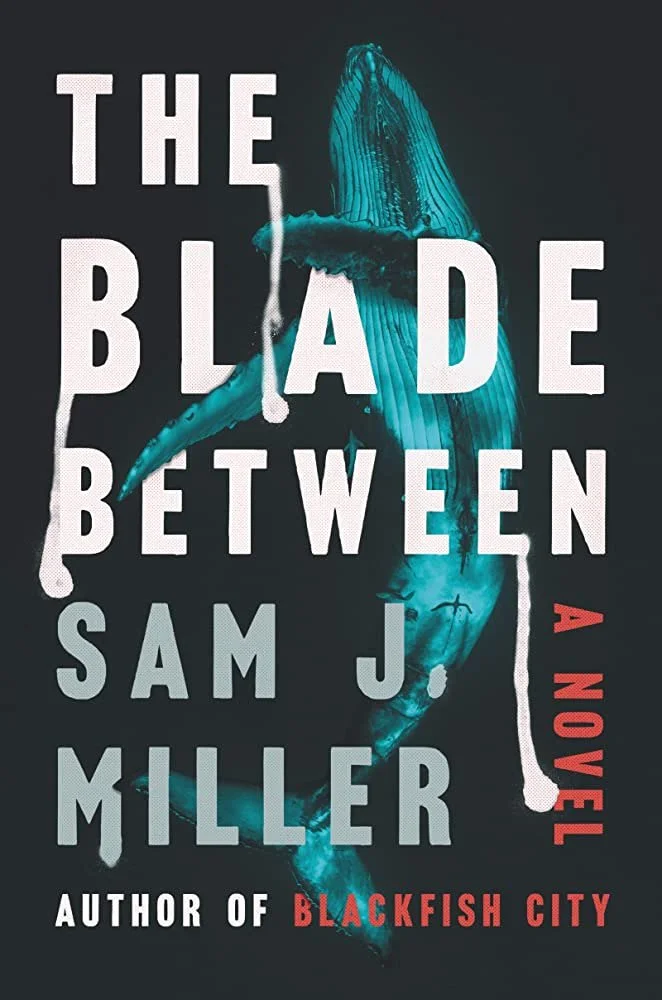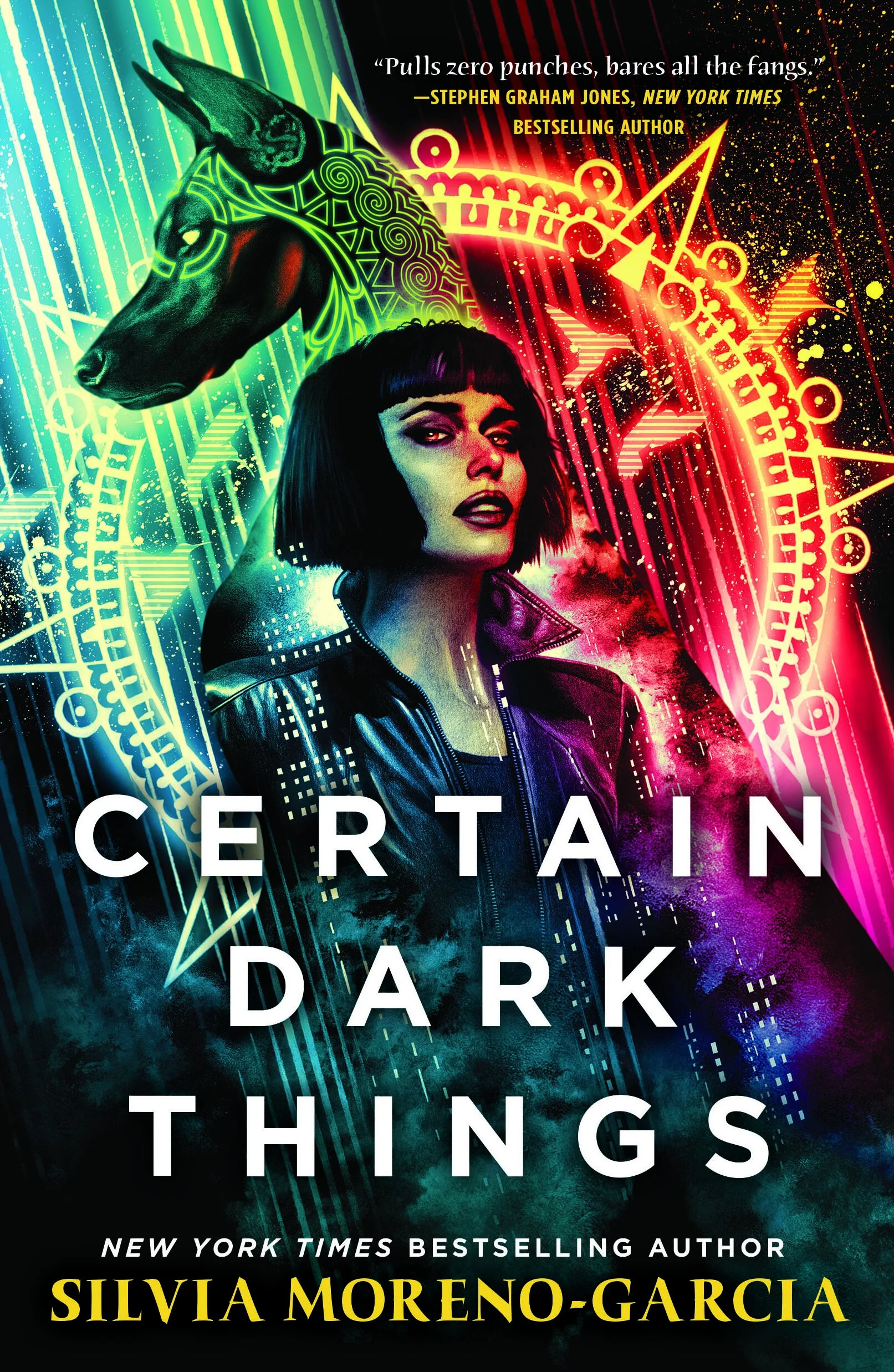Edgar's Book Round-Up, April 2023
The cover, which I quite like.
I led off the month with Mariana Enriquez’s Our Share of Night, translated from the Spanish by Megan McDowell. The novel has been receiving some high praise, and was selected for a Discord-based book group, and I cannot stress enough how true every good thing you might have heard about it is, and how thrilled I am, a full month after finishing it, to have read it. It is, approximately, about a man seeking to protect his sun from the esoteric cult that seeks to use their powers to its own ends; it is also the kind of novel ill-served by any description of its plot. It’s a big novel, ranging across the latter half of the twentieth century and across the Atlantic ocean, but its core is in Argentina in the 1970s and ‘80s; the background of political violence only puts up the disturbing privilege and even more disturbing practices of the cult. It would have been easy for this to be an elevated thriller; it would have been easy for it to be a grody but gothic novel: instead, Enriquez has rolled in elements of those and other genres, counting on the reader’s familiarity with genre (and esotericism) to allow her to spin out a novel that holds the reader in its basilisk stare until the bitter end. While I cannot speak to Enriquez’s Spanish, McDowell’s English translation offers rich, juicy prose that never overwhelms but is also so beautiful I found myself whispering the words after I had read them. I am so thrilled to have read this novel, and just as excited to get into Enriquez’s other work.
And then I finished my re-read of Grant Morrison’s run of Doom Patrol, which really put the month off to a great start. The only print works in this round-up — I’ve been making my way through a 19th-century brick, okay, and I needed a break — I reread them because I love them and it had been a while. They’re not perfect, I know; I cannot help but love them, because I read them first when I was in my teens and they changed my approach to story and character. Morrison’s ability to give real weight to the characters’ internal struggles even as the absolute most nonsensical shit is happening around them impressed me then and it impresses me still. Elizabeth Sandifer, in her massive undertaking, Last War in Albion, offers a pretty even-handed assessment of the run which begins here and continues for… a while. It, like her other work, is a great read by itself, especially if you enjoy Morrison’s run of Doom Patrol as much as I do. But even as she raises really valid points about Morrison’s approach, especially to the character of Crazy Jane and the incredible debt to (read: wholesale theft from) Truddi Chase for the character, she concludes her discussion of Morrison’s run by saying:
The big accomplishment of Morrison’s Doom Patrol, in the end, was that it was a bracingly weird bit of comics that people found comfort in, and that proved a rallying point for any number of freaks and outcasts to bond over. Whatever the flaws of Morrison’s treatment of Jane, Rebis, or Danny, there were real queer, mentally ill, and plural people who read Doom Patrol and saw themselves celebrated in a way that nothing else in the late 80s and early 90s offered, and that frankly not a lot in the decades that followed did either. It didn’t end the Cold War or define the secret heart of the twenty-first century. But it is, in its way, the better and more noble accomplishment. There are undoubtedly people in the world whose reason for living one night was that they wanted to see the next issue of Doom Patrol. There are far more who are simply better, weirder, queerer people for having read it. You can ask for more than that from a comic, but why would you?
As one of the people Sandifer describes in that penultimate sentence — I couldn’t agree more. Cameron has somewhat more substantial remarks on them, and maybe someday I’ll try to put my feelings in to words, but for right now, I will stick to telling on myself and move on.
The cover of Feed Them Silence — quiet and evocative, much like the novel.
Next up was Lee Mandelo’s Feed Them Silence, which offers the double whammy of being a women’s wrongs book and a wolf book. The novella — a bitter thing, taut and twisted into itself like a dead olive tree — follows Sean, a rock-star scientist, who tries to avoid the collapse of her marriage by plunging into an ethically-dubious experiment, using a neural interface to experience life through an endangered wolf’s eyes. Sean’s hubris and inability to confront her own failings make for a deeply compelling narrative, and while the lush prose style I loved in Summer Sons isn’t as present here, it’s equally impressive to see Mandelo pivot to a style that is spare almost to the point of brutality. As always, their work is a delight.
Next up, and kicking off a string of audiobooks that carry through to the end of the month, was The Apocalypse Codex, the fourth in Charles Stross’s Laundry Files. Between this one and The Fuller Memorandum, it feels like the characters and the overall narrative have hit their stride. The stories are tighter and the stakes feel more desperate than in the first two novels. They’re fun!
The cover, which is fine, basically.
I next finished The Blade Between by Sam J. Miller, which Cameron discussed here. Like Miller’s Blackfish City, The Blade Between bounces between viewpoints to tell its tale of gentrification and supernatural terror in a small city in upstate New York, centering on formerly-dissolute hotshot photographer Ronan; Dom, a cop; and Dom’s wife, Attalah: all three were friends in high school and all, in their ways, are trying to protect the city of Hudson from development spearheaded by a hilarious Elon Musk parody — but their efforts are beginning to awaken the spirits of the town’s past. But they’re scarcely the only narrators, and I was delighted, too, to see Miller return to the conceit of an audio production (in this case, a late-night radio program) as a kind of unifying thread through the story. It was difficult for me not to compare this novel to Tochi Onyebuchi’s Goliath (reviewed here), which explores similar territory in similar ways, and in the comparison, Goliath wins out, but Miller is also going in a different direction and working on a different scale. In that light, The Blade Between was by and large a success, though I had some qualms with the ending. Still, I’m glad to have read it.
Up next was Loot: Britain and the Benin Bronzes by Barnaby Phillips. A coworker had brought it to my attention, and I’m glad he did, because this ended up being a strong case for restitution, aimed for an audience who would otherwise oppose such a move. This is also, arguably, a weak point in Phillips’ book: as Nii Ayikwei Parkes noted in LARB, Phillips’ narrative interjections and personal outlook skew irretrievably towards the British, humanizing men who, while definitely human, also definitely did some unspeakable things in the ostensible service of the crown and the actual service of their own glory and enrichment, while often skirting the African people injured personally and culturally by their actions. I do think, though, that if that’s what it takes to get — to make up a guy — your Uncle Ronald on board for restitution, then it may not be a waste. And the book is deeply researched and written with real charisma, weaving anecdotes past and present with the tale of the bronzes’ creation, use in Benin culture, their theft and subsequent tangled histories. With the caveat that Phillips is making a particular case for a particular audience, I found it extremely enlightening.
The new cover, which I quite like.
We close this round-up with Silvia Moreno-Garcia’s Certain Dark Things. A reissue of an earlier publication, which was itself a fix-up of a short story, Certain Dark Things offers a world were vampires are real and well-known as a phenomenon, coming in several varieties and often making violent, underground war on one another. Into this mix she brings a young man pulled from his trash-collecting subsistence to be the Renfield to a vampire girl on the run after her family’s gruesome murder. It’s a great time: if you, like me, are a fan of Vampire: the Masquerade or related phenomena, as well as neon-drenched near-future noir, you will probably also enjoy Certain Dark Things. I’m enjoying delving into Moreno-Garcia’s back catalog, after the fun I had with Mexican Gothic, and this only makes me more committed to that goal.
※
That’s it for last month. Follow me and Cameron on Twitter if you want; you can order the anthology I’m in here, if you haven’t already.




